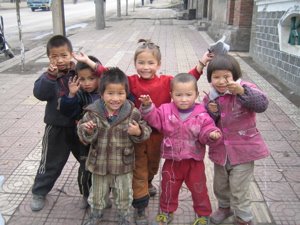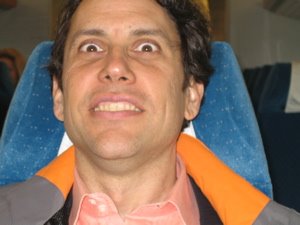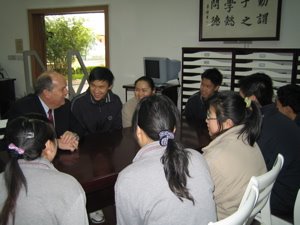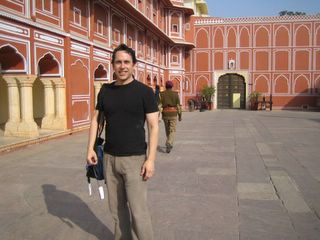The party gets going…Our first day in India was New Year’s Eve. We were resigned to letting jet lag claim us but, as night approached, Cheryl and I started to get that old New Year’s Eve feeling of “hey, we want to do something!” Our hotel was holding a major fete, stretching across its three restaurants and all public spaces. But despite the lure of the thumping bass notes, the thought of paying a hundred bucks for dinner and the possibility of getting caught on the ActionCam being broadcast in the lobby were deal-breakers. And frankly, the handful of early attendees made it look more like the Davis Polk employee Christmas party than a must-attend international soiree. So we hoofed it to a nearby mall.
First we dined at “Punjabi By Nature,” a packed restaurant where we sampled various tandoori delights to the background of American rap music. I allowed myself a Blue Lagoon cocktail and a big pile of naan to get into the mood. Then we popped by the record store to check out the latest in Indian pop music. “What’s essential? What should we bring home?” we demanded. It turns out that Indian record-store guys are like record-store guys all around the world. They conferred and debated in Hindi and then ran around the store pulling out various party mixes, soundtracks and bangra hits. I demurred on Fifty Cent’s “Get Rich or Die Trying” but did purchase “Everybody on the Dance Floor!” Then we wandered over to Passion for Tea, a tea shop that featured employees in Baskin Robbins-type caps and a karaoke machine! Though nearly empty, this was clearly the place to be!
It’s showtime in New Delhi!A young guy in a brown polyester suit manned the machine. His commitment to singing song after song in the face of complete public indifference led us to believe that he was the MC. Though he had some melodic challenges (“Hotel California” is a stretch for the best of us), he did maintain a consistent level of enthusiasm, and we respect that! He gladly yielded the mike, and Cheryl and I stepped up to sing “Take Me Home Country Road.” The crowd, ever-growing, responded with cheer and enthusiasm to the slick New Yorkers, and hip Indian girls burdened with boring dates boldly made eye contact with me. I later attempted “The Greatest Love of All” with far less success, but my voice-cracking didn’t seem to matter. No attitude here, the party was on!
The average age of the crowd dropped with the mercury as the night wore on. Yuppies gave way to twenty-something couples, who were replaced around midnight by skinny adolescents wearing low-rise distressed jeans, rocker t-shirts and international teen expressions of utter ennui. Still, we all managed to blend and appreciate our diversity in the big crazy world that is modern India.
We chatted with the MC. He revealed that he wasn’t a tea shop employee at all, but rather a college grad working in his family’s plastic bags manufacturing company. Passion for Tea was his personal clubhouse. After a long day manufacturing bags, he came here to chill and be artistic. As my personal trainer Doug might say, “Nice.”
Equally fascinating were the karaoke videos themselves. Instead of the usual blond people walking around Japanese parks ponds in Japan, each one featured—perhaps as a special Korean branding device?—three rubberish grey cartoon characters who performed ever-changing aerobic routines to the rhythm of the music.
These rubber characters were transfixing, yet their weirdness raises a broader question: where the hell were we? Were we even in India? Or were we just gross tourists hanging out with Western wannabees? What’s real in India?
What's real, anyway?Even though I tend to resent these kinds of question when I get them from other travelers (especially “sandalista” types—Euro, American or Australian backpackers who talk about “sustainable travel,” rarely wash their hair, and seem appalled that I have an American Express card) I have to admit they are legitimate. When I read articles written about other parts of the world, the reporters always seem to be interviewing doctors, professors and architects even if they’re in, like, Kurdistan.
It’s easy to think that India is on the fast-track to the first-world when you eat at “Punjabi by Nature” or read Thomas Friedman’s book, “The World Is Flat” (currently the number-one seller in English-language bookstores in India). We Americans make all kinds of excited generalizations about whatever country is in the news, and now it’s India. We hear regularly about the hundreds of millions of people in India’s middle class. We see Indians increasingly as smart and successful people. You can hardly throw a Frisbee on U.S. campus without hitting an Indian person with an 800 GMAT. Columnists like Thomas Friedman and Nicholas Kristoff exhort American kids to get off their fat, lazy asses, given the fact that hundreds of millions of Indian and Chinese kids are busy studying and planning their entries to the Intel Talent Search rather than playing Grand Theft Auto. India is happening!
The context… Those facts are true, but here some others: only five percent of Indians speak English “comfortably” (in the words of writer Gurcharan Das, the former CEO of Procter & Gamble India, and author of the great book, “The Elephant Paradigm: India Wrestles with Change”). Another ten percent operate in English with minimal proficiency. Eighty-five percent don’t speak English at all. There are close to 200 million people in the Indian middle class (more on this later); at the same time, 260 million Indians live on less than a dollar a day. Seventy-six percent of Indians don’t have access to flush toilets, and more than 40% of the country is illiterate, including more 50% of women. (These are mostly 2002 data.) Out of 162 countries, India ranks 127 on the UN’s human development index. So India isn’t Europe, it isn’t Taiwan, and it isn’t Mexico.
That being said… we Americans had better get off our fat, lazy asses because change is a-coming.
India is different now. It’s more prosperous, more worldly and, most of all, more confident. In the late 80s, I heard a lot of things like, “We have five thousand years of civilization, what else could we need?” You don’t hear this much anymore. Instead, you hear the buzz of activity: new construction, GMAT coaching schools, and social and political change, in addition to the economic ones.
A key part of this is the emergence and growth of the Indian middle class. Observers say that the growth in the middle class is the key to transforming a poor country, and they are right. The middle class increases in numbers when poor people move up. The average middle class person in India, placed in the U.S., would seem really poor in material terms. But being middle class really has to do with aspirations and values—using education, hard work and savings as methods of moving forward—and as far as I can tell, the 200 million or so members of the Indian middle class have these in spades.
One middle-class storyI’ll give you an example—a friend from my foreign service days I’ll call Pradeep. He never graduated high school, and his wife is illiterate. Seventeen years ago, Pradeep was a contract laborer for the U.S. Embassy. He worked as a gofer and earned 20 rupees a day (less than US$2). Now, at age 43, after nearly 25 years of service, he’s risen to data entry clerk, and is an employee of the embassy rather than a contractor. He earns about US$300 per month.
But here’s the thing. Pradeep is building a house. His son and daughter are in private schools on an extended day program. They go to school from early morning until 5 or 6 pm. After homework and dinner, they are allowed watch cartoons for half an hour before they go to bed and start all over again. Pradeep’s household does not have a car, does not have a washing machine, and has extremely few material possessions. But they basically have everything they need to move ahead in life. Pradeep used to be poor and now he’s not. His wife is illiterate, but his daughter reads Harry Potter. I’m confident both his kids will go to college. The family is movin’ up.













